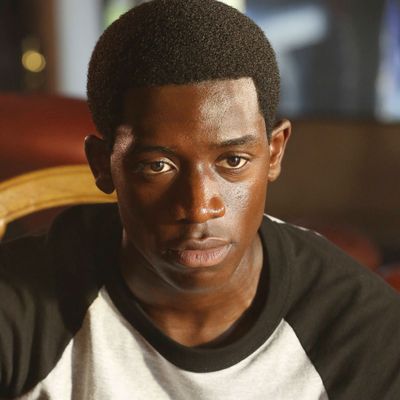
Ever since the project was announced, I labored under the misperception that FX’s Snowfall, about the rise of crack in the 1980s, was going to be another The People v. O.J. Simpson. The finished product is a plot-driven, retro-pulp thriller that takes more of its cues from gangster movies than from docudramas. The most striking thing about Snowfall, though, is that it never seems less exciting, less special, than when it’s doing the standard Scorsese/Tarantino thing and putting groups of treacherous men (and a few women) at cross purposes, then watching them threaten and bluff each other until the guns come out (or don’t).
What makes this series from John Singleton, Eric Amadio, and Dave Andron unusual is the attention it pays to the sights, sounds, and textures of people’s lives in 1983 Los Angeles, and to fine details of characterization — in other words, the sort of stuff that would never get a dramatic series a green light unless drugs and violence were attached to it. A good many people will watch the show for the whacking, not the yakking, and I totally get that, but Snowfall is more compelling when it’s showing the complicated racial dynamics of a Jewish landlord watching his African-American property manager evict a family of black folks, or a Mexican-American pro wrestler staring in longing at a woman he thinks is out of his league, or an African-American teenager who’d like to be the next Frank Lucas letting a scary Israeli cocaine dealer describe him and a friend as his “sons.”
Singleton, Amadio, and Andron and their crew of directors — whose ranks include Singleton himself; Adil El Arbi and Bilall Fallah, who directed the Belgian thriller Black; and regular Atlanta helmer Hiro Murai — set the major players on parallel tracks early, then slowly bring them into the same orbit. One apparent goal is to show different facets of the cocaine trade during the 1980s, when Ronald Reagan’s wife Nancy fronted a “Just Say No to Drugs” campaign while his administration funded right-wing Central American governments with drug money. A lot of these details were laid out in investigative journalist Gary Webb’s “Dark Alliance” series of newspaper stories, which explored the ties between the Nicaraguan Contras, the CIA, and black neighborhoods in Los Angeles. Every major character is either involved in the drug trade or is (unbeknownst to them) close to it. But rather than go for a vibe like The Wire or Steven Soderbergh’s Traffic, which explored the drug trade with a newspaperman’s anthropological detachment, Snowfall aims for a bouncier, more seductive vibe.
English theater actor Damson Idris stars as Franklin Saint (yes, that is his name — this is not a subtle show), a teenage weed dealer who lets himself get talked into fixing a rich white preppy client’s problem with the aforementioned Israeli, Avi (Alon Aboutboul). Avi is a party animal and a stone cold maniac, the kind of guy who tests bulletproof vests by having his underlings wear them. His burgeoning relationship with Franklin is fascinating because Franklin is a creature of pure will, and Avi seems to recognize something of himself in the young man, even though culturally they’re worlds apart. The source of his ambition remains somewhat mysterious even after you find out key details of his life (his aunt and her boyfriend are weed dealers, and his father appears to be homeless). The show treats Franklin as the African-American version of one of those early Tom Cruise characters who climbed the social ladder by constantly raising the stakes of his own life.
There are lots of characters like that, some fabulously wealthy, some barely scraping by, others hovering somewhere in the middle of their respective organizations, doing just well enough that they start to resent not doing better. The CIA is represented by Teddy McDonald (Carter Hudson, a hangdog-handsome character actor in his first major role), who gets pulled into a crime scene cleanup by a Nicaraguan paramilitary figure (Sergio Peris-Mencheta) and ends up laying the groundwork for what’ll probably become the Iran-Contra scandal. The wrestler Gustavo “El Oso” Zapata (Sergio Peris-Mencheta) is a nearly washed-up athlete hanging around the fringes of the underworld, like Terry Malloy in On the Waterfront or Butch Coolidge in Pulp Fiction, doing petty, violent things for pocket money; he gets pulled into the orbit of Lucia (Emily Rios of Breaking Bad), who is plotting to take over her cartel.
The series is cleverly structured, ending each installment on a moment of sudden reversal or complication, so that you’re curious to see what happens next whether you care about all the characters or not. It’s bag-of-chips plotting: You were just about to seal the bag, then something happens that makes you crave just one more chip, or several. There’s a junk-food aspect to some of the filmmaking, too: The directors have a tendency to whirl the camera around or stage endless tracking shots when they can’t figure out how else to make exposition exciting, and a lot of the music cues are on-the-nose, or up-the-nose: The Fixx’s “One Thing Leads to Another” playing over Teddy’s excursion to Central America; a drug-fueled orgy scored to the Rolling Stones’ “Monkey Man,” which at this point should be marked “Property of Goodfellas” and retired. But every time you’re thinking about throwing your hands up, along comes a small detail you’ve never seen on American television, such as a tenant hiding a mason jar filled with raw chicken and milk in her apartment to punish the landlord for evicting her. And the acting, particularly by Idris, Rios, Peris-Mencheta, and Hudson, is phenomenal.


